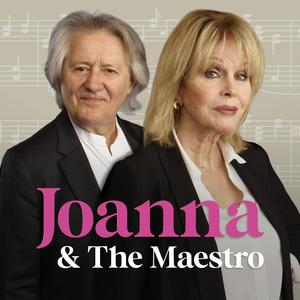
Joanna Lumley & The Maestro
Bauer Media
Joanna Lumley and her husband Stephen Barlow invite you into their home for a fascinating, funny journey into their shared love of music. You probably know Joanna Lumley, but you may not be aware that her husband Stephen Barlow is a famed conductor, composer and musician - and the pair of them are passionate about classical music. On this, their new podcast, the pair welcome you into their home for a personal, fascinating and funny journey through a musical world. Joanna is the enthusiastic amateur - asking the questions she’s always wanted to ask - and Stephen is The Maestro, providing the answers. Who was better: Mozart or Beethoven? Why do certain pieces of music make us feel a certain way? What do conductors actually do? They also discuss the great composers and symphonies, and the often-remarkable stories behind them, all delivered in Joanna and Stephen’s unique, engaging and affectionate way. Maybe you think classical music isn’t for you? Or you know a little and want to know more? Or perhaps it's been a lifetime love? Regardless, you definitely need to meet Joanna & The Maestro.
- 19 minutesThe Piano Tuner
This week Joanna and Stephen are joined by a very special guest, Stephen's personal piano tuner, David Widdicombe. From concert grands, upright 'domestics' and honkytonks, David has tuned them all. Having worked with the world's most prestigious piano maker, Steinway, for 3 decades David tells us about his life working alongside the world's most gifted players, how fractions of millimetres make all the difference and how to find the perfect 'temperament' from your own “Joanna”.
8 February 2024, 1:00 am - 34 minutes 46 secondsThe Bohemians: Martinů & Janáček
This week we’re diving into two bohemian heroes of classical music, Bohuslav Martinů and Leoš Janáček. Stephen remembers encountering the music of Martinů at Cambridge, and being confronted by the "pure simple joy" of it. From the lyricism of Martinů, we work back towards Janáček – another gifted Czech composer – and get to grips with the fairy-tale essence of The Cunning Little Vixen, Sinfonietta and the exultant Glagolitic Mass. Strap in. The Bohemians have arrived.
6 February 2024, 1:00 am - 18 minutes 19 secondsWomen Composers, the "Ol' 55" and the wonders of 'The Trout'
Which note could the Maestro not live without? Where are all the female composers? And is there a better quintet going than Franz Schubert's Trout? In this mini episode Joanna puts your questions to the Maestro.
1 February 2024, 1:00 am - 26 minutes 29 secondsA Few Blobs On A Stave
This episode is all about the written language of music, the 'hieroglyphs' or 'blobs on the stave'. Stephen and Joanna discuss the connection between reading music and words, elaborating on symbols, sounds, expression, speed and time signature. Stephen tests the boundaries of Joanna's musical literacy with a test and Wagner offers a 'moderate' interpretation of tempi.
30 January 2024, 1:00 am - 15 minutes 1 secondEarworms, Engravers and Glastonbury
Which earworm keeps the Stephen from his bedtime reading? What's stopping Joanna from going to Glastonbury? Is the Maestro being clear enough for his engraver? In this mini episode Joanna and Stephen dive into the email inbox once again...
25 January 2024, 1:00 am - 32 minutes 49 secondsLet's Get Stringy
In today's episode, Stephen and Joanna pour over some of the most passionate music ever performed and conceived - the violin concerto. They explore the mechanics of violin playing, discuss their favourite virtuoso fiddlers and also explore major works by Elgar, Brahms, Tchaikovsky and Sibelius.
23 January 2024, 1:00 am - 10 minutes 13 secondsMongolian Throat Singing & The Love For Three Oranges
In this mini episode, Joanna and Stephen explore the most pressing questions. What is the Maestro's preferred sobriquet? Music that sounds like it's from a different dimension, and how one should conduct music for the love of three oranges?
18 January 2024, 1:00 am - 39 minutes 15 secondsThe French Impressionists
Is it a faun? Is it moonlight? Yes, it's Claude Debussy! Over the next 30 minutes, Joanna and Stephen discuss the musical development of French impressionism. We see how three composers, Debussy, Ravel and Boulez, summoned images through sound and set the imagination free.
16 January 2024, 1:00 am - 11 minutes 47 secondsColours, Moods, Shoes and trouble with Transposition
In this mini episode, Joanna and Stephen field more vital questions from listeners, such as, why does transposition jangle the Maestro's mind? Which musical keys suit certain moods? And most importantly, what not to wear when meeting the President?
11 January 2024, 1:00 am - 27 minutes 24 secondsThe Glorious British Brass Band
Is there anything quite so majestic as the British brass band? Joanna and Stephen describe their first encounters with these ensembles, how they evolved and which pieces reach out to the soul. With the onset of the Industrial Revolution, brass bands first appeared as a means of fostering community ties among workers. These bands have since become popular in various contexts, from marches and competitions to concerts and even movie scores.
9 January 2024, 1:00 am - 11 minutes 31 secondsBonus Stephen Fry: The Audience, Artificial Intelligence and a very un-Hollywood story
In this bonus mini episode with the actor, writer and broadcaster Stephen Fry, we discuss why audiences matter, the transcendent force of pianist Ervin Nyiregyházi and what artificial intelligence really means for classical music.
4 January 2024, 1:00 am - More Episodes? Get the App
Your feedback is valuable to us. Should you encounter any bugs, glitches, lack of functionality or other problems, please email us on [email protected] or join Moon.FM Telegram Group where you can talk directly to the dev team who are happy to answer any queries.